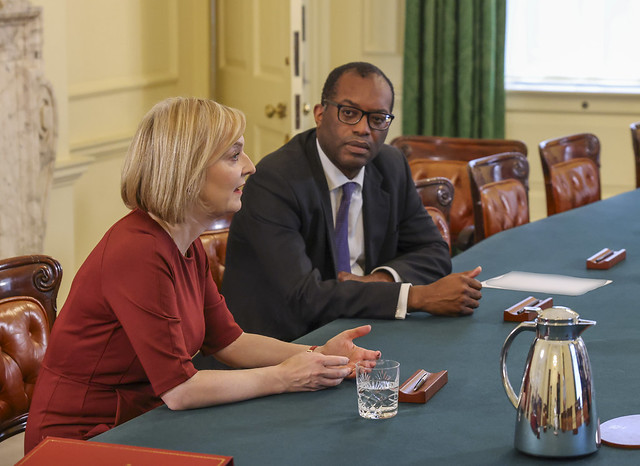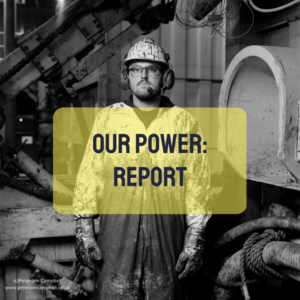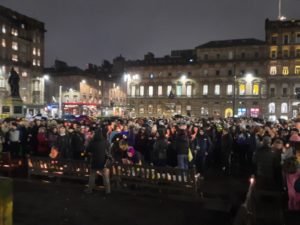Starmer’s Labour is not a force for Good
Owen Wright, former Labour candidate for the Scottish Parliament, writes for Heckle [online journal of the Republican Socialist Platform, Scotland]
Sir Keir Starmer’s Labour party is not a party worth fighting for. Any Labour victory under his leadership risks entrenching many aspects of Conservative rule which he purports to oppose, and should be treated with fear and concern by all those left of the political centre. Labour now has no understanding of the UK’s deep underlying problems and this is reflected in the Starmer leadership’s deceptive political practices and increasing propensity to indulge in far-right rhetoric and dog-whistles.

Though I am not originally from the UK, I consider myself to come from something like a ‘Labour household’. I moved from France to Scotland to study in Dundee after finishing secondary school and, after a very brief stint in the Scottish Greens, joined Labour in autumn 2017, drawn by its platform and policies which appealed to my values of progressivism, international and social conscience.
Having gained campaigning experience through my students’ association – at a time when the Brexit saga, the 2019 election and later the beginning of the Covid pandemic was unfolding – I decided to put myself forward as a Labour candidate and subsequently ran in my home constituency of Dundee East in the 2021 Scottish Parliament elections.
I’m still incredibly proud and grateful to my former Dundee CLP comrades for that opportunity. After the election, I continued to hold positions in my CLP, attended Labour’s UK conference twice and acted as an agent for a successful candidate in the 2022 local elections.
Nonetheless, in November 2022, I decided to leave the Labour party. A number of things led to the ‘breaking of the camel’s back’, which, in no particular order, I now want to set out for the record.
Transphobia
Having lived and worked with transgender people, the Labour party’s failure to defend one of the most marginalised groups in British society today sickens me. Recently, Labour said it “welcomed” proposals from the Equality and Human Rights Commission (EHRC) to strip trans people of some of their current rights under the 2010 Equality Act. This was just days after the party tried to distance itself from trans issues generally, citing the toxicity of the “debate” and its unattractiveness to the general public, which alone is cowardly – but even worse, in the same intervention, Starmer gave legitimacy to one of the spurious position that the rights of women and trans women are inherently in conflict.
This argument is regularly peddled by the most ardent of transphobes, from those in far-right circles to those appropriating the language of feminism, in order to drive a moral panic regarding trans women being in women’s spaces. This panic is based on the notion that trans women are just men pretending to be trans to take advantage of women. Similar arguments have been spread regarding trans children’s identity and presentation in schools, as well as LGBT+ education. Several Labour MPs have made those kinds of transphobic arguments, sometimes managing to pull the Labour leadership to their side.

There is reason enough to believe that Starmer is a transphobe himself. He is on record trampling on Gillick competency, effectively arguing that trans children should not be allowed to access treatment for gender dysphoria without their guardian’s permission; children with transphobic parents or guardians should be trapped in suffering. He has advocated for schools to out trans children to their parents, again endangering those children unfortunate enough to have parents who do not accept them. These positions make little sense unless Starmer himself harbours an irrational fear of trans people or trans-ness. Labour’s position under his leadership is nothing short of cowardice and stupidity at best, or open bigotry at worst.
The ghost of UKIP
Speaking of open bigotry, let’s cast our minds back a few years to the days of the coalition government and the rise of Nigel Farage’s UKIP, which was ultimately responsible for Brexit.
Like other fascists, UKIP liked to play a game of hide-and-seek – saying a highly controversial, often racialised statement about migrants, refugees or foreigners, and then hiding behind the language of ‘legitimate concerns’ and the thin veil of plausible deniability. The Brexit disaster is what we got from letting this fester. This was because politicians were incapable of steering the conversation away from migration and towards other issues underpinning the same ‘concerns’.
I make no apology for saying that I do not think migration is a fully controllable variable in politics. Migration is a natural human phenomenon, often in response to developments in people’s environments, those ranging from war, famine and drought, disease, etc. Even an economic downturn in a region of the world today can be a perfectly natural cause for someone to migrate. Migration is a fact of human life; to try and stop or control it on any kind of permanent basis seems to me a fruitless task. I’m surprised the UK’s political class hasn’t given up on “fortress Britain” after meeting failure after failure over decades.
The likes of Farage and the far-right elements of the Conservative Party seem to me to be playing nothing but a massive con to drive up their popularity. Their goal was never to control migration but to whip up an angry population in the throes of deep, painful austerity to back them and their main political projects: Brexit, then followed by a steep and purposeful decline in our living standards. Labour’s shameful surrender to that anti-migrant politics in 2015 only legitimised UKIP and likely cost Labour the election. The 2019 election firmly cemented the victory for the Conservative-Brexit camp.
During the height of the Covid pandemic, when migration was not in the spotlight of national politics, national sentiment on migration softened; polls began to show people in Britain seeing immigration as a boon, particularly as labour shortages took the media spotlight. In this time, Labour made absolutely no attempt to solidify those views, which could have blunted the resurgence last year of Conservative scapegoating tactics around migration and refugees. Instead, the Labour party is now again embracing UKIP language of ‘concerns’ with migration. In a BBC interview about NHS staff shortages, Starmer – referring not only to the NHS but the whole country – said “there are too many migrant workers”.
Describing migrant workers as too numerous implies they are a problem, rather than people who benefit our society and should be welcome here. In the context of the NHS, where there are over 55,000 frontline nursing vacancies UK-wide, and over 130,000 overall vacancies in NHS England trusts, Starmer’s simultaneous pledge to train 50,000 nurses and doctors while saying there are “too many” migrant workers in all sectors is also plainly incoherent.
The ghost of UKIP sits well in the Labour party and, with Starmer at the helm, it will haunt and poison our politics for the decade to come. The fact is Starmer’s Labour is again ceding arguments to the far-right, based on ‘concerns’ elaborated to the far-right’s benefit, not that of working people. As an immigrant who advocates for the rights of migrants, refugees and their right to a decent life like the rest of the country, I can’t stay in or support a Labour party which blindly adopts such far-right rhetoric.

Starmer is a persistent liar
Without reviewing them line-by-line, as many others have already done, we should be clear that Starmer has broken nearly all measurable pledges made during his campaign to become leader of the opposition.
Starmer sought to present himself to Labour members as ‘Corbynism but acceptable’ – giving the impression that he would take most of the radical, transformative policies of the previous leadership but sell them to the electorate more effectively than Jeremy Corbyn could. He has since trashed this impression and shown that it was something he invented for convenience during the campaign.
Both Starmer and his supporters argue that many of these radical policies are no longer feasible as the economic situation has changed due to the Covid crisis, but the timeline for this excuse doesn’t add up. By the end of the leadership contest in April 2020, the economic consequences of Covid were becoming clear domestically and internationally. Was Starmer economically clueless, bandying those promises without knowing if he’d be able to keep them, or did he lie to members? Neither possibility produces confidence.
This habit of lying about policy extends beyond the leadership contest. GB Energy, for example, has been presented by Starmer as a publicly-owned company built to compete with the private sector to bring prices down. On further examination, this seems duplicitous; it will not actually compete with the private sector but instead collaborate with it. According to Rachel Reeves, the shadow chancellor, Labour will throw £8 billion into green energy projects, but private sector investment will be required on top of that to make it viable.
The investments made by GB Energy will not be majority public-owned; the private sector will still have a controlling stake on the most vital material portions of green energy generation. As a result, GB Energy will do nothing to bring down energy prices – those who keep them high today, for profit, will still be in overall control of our energy sector infrastructure and generation.
Labour’s pledges on climate change suffer broadly from this sort of lying by omission as well. Starmer and Reeves’ pledge to borrow £224 billion to invest in tackling climate change is subject to borrowing guidelines which closely match the Conservatives’ own borrowing guidelines. If the economy under-performs or if inflation remains high, the actual figure borrowed and invested will be reduced. This does not inspire confidence or trust in Labour’s ability to tackle the greatest problem humankind has ever faced. There is also a total lack of an international dimension to Labour’s climate plans, which is crucial to reducing emissions worldwide. (Edit: As this article was being reviewed for publication, Labour – without even being in office – proved the above by reducing the amount they are pledging to borrow for the first two to three years in office, for the very reasons suggested above.)
On the NHS crisis, Starmer’s Labour suggests the private healthcare sector has a pool of doctors, nurses and specialists ready to go. This is a fantasy; that pool of recruits doesn’t exist for the private sector for the same reason it doesn’t for the NHS. That is no accident, it would seem, as Starmer and his shadow health secretary, Wes Streeting, have taken donations from wealthy private healthcare executives. This explains Starmer’s sudden change of heart on his earlier principle that healthcare and profit should not mix.
All in all, it’s very easy to simply observe reasons to not trust Sir Keir Starmer. He has lied about his person, his intentions, and continues to present policies in a duplicitous fashion. How is this man any better in terms of fostering trust in politics than someone like Boris Johnson, who did very much of the same? How could I, as a Labour member, be honest about my party’s policies to people at the doorstep when not even the party leader seems to ever be? The answer, to me, is that I could not.

The Labour left, Ukraine and Soviet-tinted nostalgia glasses
Another reason I left the Labour party was the ‘Labour left’ itself, which has proven itself thoroughly incapable of introspection or self-criticism, making blunder after blunder as a result.
The greatest example of this is its reaction to the Russian war on Ukraine, which has left me dumbfounded. While Putin, a near-dictator, made a blood-and-soil speech about Ukraine and its supposed non-existence on the eve of his invasion of the country, the Labour left still could not recognise that as fascism. Instead, many elements of the Labour party’s left flank backed the Russian line that NATO is as responsible for this war as Russia. As much as I am not in favour of NATO overall, any such claims can only be qualified as bogus and attempted justification for the invasion.
While initially I thought this was a legitimate response to genuine concern about escalation of the conflict – as I too spent weeks in anxiety about the possible launch and detonation of nuclear weapons – it became impossible, in the face of escalating Russian war crimes and genocidal acts, to view the repetition of Kremlin talking points as defensible. This became a factor in my eventual decision to leave the party.
With the exception of John McDonnell, who now supports arms for Ukraine and backs the Ukraine Solidarity Campaign, the Labour left has yet to learn from these mistakes. To be relevant in the 21st century, the Labour left must clearly move itself away from Cold War-era geopolitical analysis.
Beyond this, however, the left of the Labour party has also yet to realise that the battle within the party has already been lost. The Starmer leadership is doing all it can to avoid having new left-wing MPs in its next, probably quite sizeable, parliamentary cohort. Moves to restore the electoral college for leadership elections may eventually ensure a left-wing upstart like Corbyn can’t take part in a Labour leadership election again, let alone win. The right of the Labour party is on a crusade to eliminate or at least fully suppress the left of the party.
Recently, Labour has actively prevented the incumbent mayor for North of Tyne, left-winger Jamie Driscoll, from running for North East mayor without clear justification. The notion that the Labour leadership are seeking to purge the left of their party from political positions is exemplified here. The ways the left of the Labour party can resist such a move are in practice, non-existent.
Momentum’s argument that left-wingers can stay, fight and win internally falls flat when recognising that the real systemic power of the Labour party doesn’t lie with its membership but with the upper ranks of its parliamentary party. The size or prevalence of the left-wing membership doesn’t matter, as it can be – and regularly is – completely ignored by the parliamentary cohort and leadership.
The left in Britain needs to undergo a process of intense introspection and re-establishment outside of the Labour party or it could well cease to exist as a political force entirely. That Momentum and others on the left of the Labour party do not acknowledge this necessity shows how naïve they have become about their systemic position, leaving them perpetually aimless and incapable of achieving their overarching political goals, many of which I share.
Conclusion
It took agonising weeks of thought to lead me to the conclusion that the Labour party is no longer the force for good that I thought it was. The only people for whom it is now reliable are those who already have wealth and social and material power. Most of us – no matter the size of our payslip, whether we rely on foodbanks or not, or whether we consider ourselves ‘Labour at heart’ – are not these people. There is no shame in calling Labour out for their abandonment of us.
I hope that this state of affairs one day changes again. Hope is not something often repaid in our politics, however, so the only thing left for me, as well as no doubt many others, was action, and that action was to leave the Labour party. I recommend others who care about the truth and honesty in progressive politics do the same; it may be the only way to show our discontent. And perhaps, something new can be born out of it, with time.
Owen Wright is a former Labour member who ran as the party’s candidate in Dundee City East in the 2021 Holyrood elections.
Article and pictures republished from Heckle: https://heckle.scot/2023/06/starmers-labour-is-not-a-force-for-good/
Online magazine of Republican Socialist Platform (Scotland)






 The Indigenous-led uprising in Ecuador in October 2019, and the similar national strike mobilisation in June 2022, have been two of the most dramatic, and successful, in a wave of big struggles and protest movements that swept the world in recent years – from Hong Kong, Iraq and Lebanon, to Chile, Colombia and now Peru and Iran. Thousands of indigenous people went onto the streets of Ecuador to demand reforms in agricultural payment, to tackle the cost-of-living and poverty, to defend indigenous communities and to protect the natural environment from destruction, exploitation and profit-driven extractivism. The indigenous movement marched on the national capital, winning support from workers’ organisations, from students and from the womens’ movement.
The Indigenous-led uprising in Ecuador in October 2019, and the similar national strike mobilisation in June 2022, have been two of the most dramatic, and successful, in a wave of big struggles and protest movements that swept the world in recent years – from Hong Kong, Iraq and Lebanon, to Chile, Colombia and now Peru and Iran. Thousands of indigenous people went onto the streets of Ecuador to demand reforms in agricultural payment, to tackle the cost-of-living and poverty, to defend indigenous communities and to protect the natural environment from destruction, exploitation and profit-driven extractivism. The indigenous movement marched on the national capital, winning support from workers’ organisations, from students and from the womens’ movement.